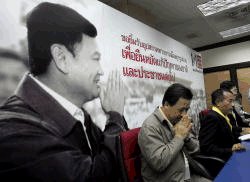Thai conundrum
 It's rather odd to a layman that a government should endorse a military-backed leader after having condemned a military coup that overthrew the previous leader. The oddity came into play in Thailand recently.
It's rather odd to a layman that a government should endorse a military-backed leader after having condemned a military coup that overthrew the previous leader. The oddity came into play in Thailand recently.
Like all foreign governments, the Singapore government condemned the military coup that overthrew former democratically elected Prime Minister Thaksin Shinawatra last month.
The chorus of global condemnation itself was highly questionable. This is because many Thais, especially in Bangkok, appear to support the removal of Thaksin. But many kampung folks seem to still support him. Regardless of the level of support, Thaksin has resigned from the former ruling party Thai Rak Thai (pix), marking the beginning of the end of the party he founded.
Perhaps, the most important socio-political indicator in Thailand is the support of King Bhumibol Adulyadej -- the paramount moral leader of the country -- for the coup to overthrow a leader who has been besieged by allegations of corruption and improper behaviour. The allegations surfaced when he structured the sale of his family flagship Shin Corporation to Singapore government investment arm Temasek Holdings to avoid paying tax.
The military-led government has since appointed former general Surayud Chulanont as the country's interim PM. The Singapore government has been one of the first foreign governments to endorse the new Thai premier. Singapore PM Lee Hsien Loong said he is glad that Surayud has the endorsement of the King, and is confident that the Thai premier will also have the support of the Thai people in exercising his responsibilities.
Isn't the endorsement of the military-backed PM inconsistent with the condemnation of the military coup in the first place? If the blessing of the King was a key factor as seen in the endorsement of the new Thai PM, did Singapore and other countries jump the gun in condemning the military coup that had the blessing of the King as well?




No comments:
Post a Comment